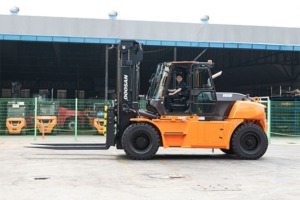The Big Differences Between Diesel and Li-Ion
When it comes to choosing material handling equipment for your business there are a range of options available. Two of those options are lithium-ion and diesel. In this article we will discuss the big differences between them and the benefits of both.
The Big Differences Between Lithium-Ion and Diesel Forklifts
 Diesel forklift trucks are the tried and tested solution for many operations that are looking for a workhorse machine that can work alongside multi-shift patterns to maximise throughput. However, over time Lithium-ion forklifts have made rapid advancements to be able to compete as the machine of choice for these businesses.
Diesel forklift trucks are the tried and tested solution for many operations that are looking for a workhorse machine that can work alongside multi-shift patterns to maximise throughput. However, over time Lithium-ion forklifts have made rapid advancements to be able to compete as the machine of choice for these businesses.
There are a few reasons why they have become so popular, including their reduced environmental impact, lower noise and vibration, lower maintenance and costs and flexibility.
Environmental Impact
Lithium-ion forklifts are known for their eco-friendliness. Unlike their diesel counterparts, they emit zero emissions during operation, as well as contributing to cleaner air. This means that they can more closely align with your business’s sustainability goals and increasingly strict environmental regulations.
Operational Efficiency
Unlike diesel forklift trucks, lithium-ion machines offer superior operational efficiency because of their faster acceleration and quick, precise load handling when compared to diesel forklifts.
Whilst electric forklift trucks have been an alternative for decades, the latest lithium-ion machines offer a long battery life, minimising downtime for recharging or refuelling. Diesel forklifts need regular refuelling and maintenance, which can interrupt workflows and result in additional operating costs, especially as they age.
Maintenance and Costs
One of the biggest advantages that lithium-powered machinery has, is that they require zero maintenance. There is no need for engine oil changes or fuel filter replacements, in addition to storage and safety concerns lithium-ion machines offer long-term cost savings.
In addition to this, lithium-ion batteries have an extended lifespan, reducing the frequency of replacements. Diesel forklifts require regular servicing, fuel purchases and engine maintenance, leading to higher operating expenses over time.
Continue reading to find out more about the differences between lithium-ion and diesel forklifts.
If you would like to find out more about what Dawsongroup material handling can offer or about the Smarter Asset Strategy, then get in touch today.
To find out how Dawsongroup can support your business, request a free consultation with a Dawsongroup expert by completing the contact form below.
UK Head office
Delaware Drive
Tongwell
Milton Keynes
MK15 8JH

Dawsongroup Limited | Company reg. no. 01902154 (registered in England and Wales)